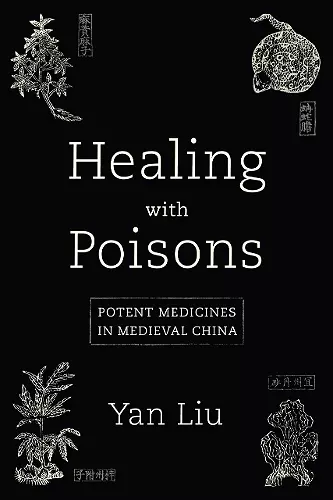Healing with Poisons
Potent Medicines in Medieval China
Format:Hardback
Publisher:University of Washington Press
Published:27th Jun '21
Currently unavailable, and unfortunately no date known when it will be back
This hardback is available in another edition too:
- Paperback£27.99(9780295748993)

Winner of the 2023 William H. Welch Medal, sponsored by the American Association for the History of Medicine
A revealing study of risky cures in classical Chinese pharmacy
At first glance, medicine and poison might seem to be opposites. But in China’s formative era of pharmacy (200–800 CE), poisons were strategically deployed as healing agents to cure everything from chills to pains to epidemics. Healing with Poisons explores the ways physicians, religious devotees, court officials, and laypeople used powerful substances to both treat intractable illnesses and enhance life. It illustrates how the Chinese concept of du—a word carrying a core meaning of “potency”—led practitioners to devise a variety of techniques to transform dangerous poisons into efficacious medicines.
Recounting scandals and controversies involving poisons from the Era of Division to the early Tang period, Yan Liu considers how the concept of du was central to the ways people of medieval China perceived both their bodies and the body politic. Liu also examines a wide range of du-possessing minerals, plants, and animal products in classical Chinese pharmacy, including the highly poisonous herb aconite and the popular arsenic drug Five-Stone Powder. By recovering alternative modes of understanding wellness and the body’s interaction with potent medicines, this study cautions against arbitrary classifications and exemplifies the importance of paying attention to the technical, political, and cultural conditions in which substances become truly meaningful.
Healing with Poisons is freely available in an open access edition thanks to TOME (Toward an Open Monograph Ecosystem) and the generous support of the University at Buffalo Libraries.
DOI 10.6069/9780295749013
"Healing with Poisons contradicts the romantic fallacy of viewing traditional medicines as toxin-free remedies and proposes a new scope to reconceptualize the poisons used in medieval China. His study inspires us to rethink the relationships among drugs, cultures, and human bodies in the past and present."
* East Asian Science, Technology and Society *"Liu writes with an accessible, clear and inviting voice. It will prove to be excellent material for teaching in cross-cultural contexts... This nimble and accessible book will surely lay the foundation for more adventurous studies to follow."
* Social History of Medicine *"Based on a comprehensive study of the most significant Chinese texts, Liu offers a clear exposition for advanced students and specialists of the development of these medicines and provides a list of some of the most important drugs and their uses."
* Choice *"Scholars will find this fascinating exploration of Chinese pharmacology a pleasure to read, with short, well-structured chapters and a coherent arc to the argument throughout."
* Journal of Asian Studies *"Liu Yan offers a most remarkable and so far uniquely informative account of the social, economic, political and structural context of medicine and pharmaceutical learning and practice in China in the first millennium CE."
* Monumenta Serica *"Healing with Poisons masterfully weaves together the histories of medicine and the body."
* World History Encyclopedia *"Liu has adroitly interwoven histories of politics, religions, social, and economic histories at opportune moments to elucidate how medicine, particularly potent substances, worked within emerging intellectual frameworks of xuanxue (mysterious or dark learning) and competing religious traditions of Buddhism and Daoism."
* Journal of the History of Medicine and Allied Sciences *"This scholarly, well-referenced work explores China’s formative era of pharmacy (200–800 CE) when poisons were considered potent healing agents. Toxic plants provided cures for everything from simple abdominal pain to epidemic diseases. Practitioners devised techniques to transform them into effective medicines, incorporating the concept of du, or “potency.” Many old methods are still employed today. Liu...gives insight into the Medieval healing philosophy and its influence on modern Chinese medicine."
* American Herb Association Quarterly *"An indispensable monograph for scholars and medical practitioners interested in Chinese medical history and those studying medieval Chinese history more generally."
* Asian Medici- Winner of William H. Welch Medal 2023 (United States)
ISBN: 9780295749006
Dimensions: unknown
Weight: 544g
276 pages